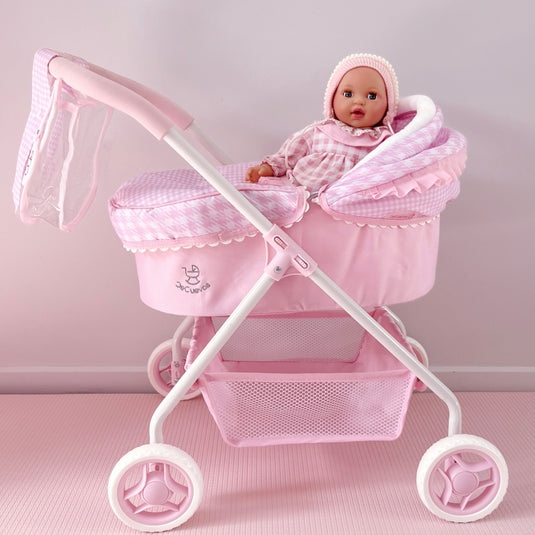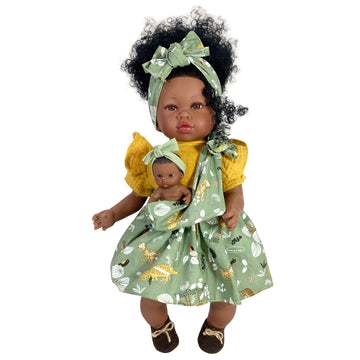Little Known Questions About Dolls And Accessories.
Table of ContentsDolls And Accessories Fundamentals ExplainedSome Known Details About Dolls And Accessories Dolls And Accessories Things To Know Before You Get ThisHow Dolls And Accessories can Save You Time, Stress, and Money.Some Ideas on Dolls And Accessories You Need To Know10 Simple Techniques For Dolls And AccessoriesThe Of Dolls And Accessories
When dolls are consisted of in team play, kids practice waiting, sharing, and paying attention to others' concepts. Whether they're claiming to be a parent, brother or sister, or friend, children find out how relationships workhow to support others, fix disputes, and take care of somebody else. These early role-play experiences become the foundation for healthy friendships and relationships later on in life.Repeating soothing routines with a doll (feeding, shaking, putting to bed) can assist children feel calm and safe and secure. These comforting rituals instruct them how to self-regulate. Dealing with a doll can make a youngster feel qualified and positive - dolls. It provides them a sense of responsibility and control in a world that often really feels unpredictable.
Some Known Questions About Dolls And Accessories.
When youngsters see dolls that reflect their race, heritage, and society, it strengthens a favorable sense of identity. It states, "You belong. Your story matters." Dolls also present children to cultures outside their very own, building respectful curiosity and empathy for others. This is where comprehensive play can bring about comprehensive areas.
As Dr. Karyn Purvis, a leader in youngster advancement and trauma-informed treatment, once stated: This powerful quote highlights exactly how play isn't simply funit's exactly how kids learn finest. The mind cords itself via rep. When a youngster is involved, joyous, and psychologically attached to an activitylike doll playthe mind strengthens those connections quicker and a lot more meaningfully.
Not known Facts About Dolls And Accessories

Kids need empathy, kindness, and creative imagination tooand doll play supplies that. Dolls are frequently a kid's first "friend," helping them practice partnerships, construct interaction abilities, and really feel comforted.
The 5-Minute Rule for Dolls And Accessories
Through dolls that matter. Samantha Ong Samantha Ong is the founder of Joeydolls, a Canadian-based toy brand on a mission to celebrate Asian cultures via happy, comprehensive play. Motivated by her very own experiences expanding up without cultural representation, Samantha makes dolls that aid kids feel pleased of who they are while stimulating interest and compassion in others.
Playing with dolls encourages youngsters to chat more concerning others' ideas and feelings, a study has actually discovered. The research recommends that playing fictional video games with dolls could aid kids create social skills, theory of mind and empathy.
Dolls And Accessories Can Be Fun For Everyone
They were likewise more probable to address the dolls in the 2nd person, speaking with them directly, whereas the characters on the computer screen they had a tendency to describe in the third person. No difference was observed between children and girls."Inner state language can show that a kid is considering various other individuals's ideas and emotions while playing with dolls," said Gerson.
Which they see language usage hereof is good verification of the hypothesis."Mardell included that the findings ought to relate to any kind of role-play toy, rather than specifying to Barbies. "I 'd take a wider view of what a doll is," he stated." [It could be] any item that the youngster can invest a sense of various other into a packed pet, a stove mitt that speaks with them, and even a fictional friend."Children commonly begin to show indicators of inner state language around the age of 4.
6 Easy Facts About Dolls And Accessories Explained
"It ends up being vital for making and maintaining friendships, and how they pick up from their educators, and moms and dads."The research also located that the children had enhanced brain activity in the posterior exceptional temporal sulcus (pSTS) region when they talked as though their dolls had ideas and feelings. The pSTS region is believed to be included in the development of social and emotional handling abilities.
Childhood years is not a static life stage; without a doubt, the definition, significance and understanding of childhood are all subject to modification. By the 19th century among one of the most extensive adjustments was the value positioned on enabling youngsters to experience "the carefree delights" of childhood through playtime activities. Play was now thought about to be a crucial component of a great youth.
In order to totally recognize the significance of play, one have to additionally recognize the significance of the doll. Nevertheless, dolls are far more than playthings made to captivate young women. During the 19th century correct playtime tasks were chosen to promote intellectual, physical or emotional advancement. Dolls were especially prominent due to the fact that they were believed to promote and nurture feminine top qualities such as generosity, caring and empathy.
Some Known Factual Statements About Dolls And Accessories

It is only via historical investigations that researchers can intend to reveal and record the full variety of play experiences. Chronicling these experiences, and specifically the role of dolls, is essential for providing a much more complete picture of childhood years throughout the nineteenth century. Alarcn, Sara E - dolls., "Youngster's Play: The Duty of Dolls in 19th Century Childhood" (2007 )